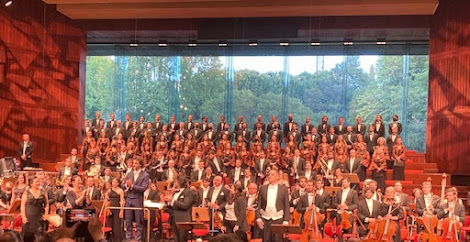Como já escrevi no blogue várias vezes, o Requiem é uma das minhas obras favoritas de G Verdi. É um marco nas composições corais do Sec. XIX, com uma musicalidade ímpar, um poder avassalador e uma força telúrica brutal que, quando bem interpretada, nos transporta para uma dimensão transcendental. Obra que constantemente contrasta o dramatismo e o lirismo, tem no Rex tremendae, no Confutatis maledictis e, sobretudo, no Dies irae as componentes mais dramáticas, contrastando com o lirismo comovente de Liber scriptus e Lacrimosa.
Nesta produção, a Gulbenkian abriu as cortinas que dão acesso aos jardins da Fundação quando se interpreta a Lux aeterna, um motivo adicional digno de registo.
Foi um excelente espectáculo, ao contrário da última vez a que assisti a esta obra na Fundação Gulbenkian em 2015 em que, por culpa do maestro Paul McCreesh, tivemos um Requiem acelerado, estridente e sem alma! Apesar do mau espectáculo, o maestro teve um gesto de grande simpatia, homenageando a violoncelista Maria José Falcão que tocou pela última vez na Orquestra Gulbenkian. Hoje estive longe do palco, mas pareceu-me ver Maria José Falcão no naipe dos violoncelos o que, a ter sido verdade, registo com grande prazer.
Lorenzo Viotti dirigiu superiormente o Coro e a Orquestra Gulbenkian, que estiveram ao seu melhor nível.
Esta obra exige 4 solistas de qualidade superior e foi o que tivemos. Todos sempre bem audíveis, mesmo sobre a orquestra e coro quando em forte, e com vozes bonitas e perfeitamente adequadas: Marina Viotti (mezzo), Joshua Guerrero (tenor), Adriana Gonzaléz (soprano) e Mika Kares (baixo, um dos melhores que ouvi nos últimos anos).
Um espectáculo extraordinário para encerrar a minha temporada na Gulbenkian.
*****
REQUIEM, Verdi, Gulbenkian Foundation, May 2022
As I've blogged several times, Requiem is one of my favorite works by G Verdi. It is a landmark in the choral compositions of the Sec. XIX, with a unique musicality, an overwhelming power and a brutal telluric force that, when well interpreted, transports us to a transcendental dimension. A work that constantly contrasts drama and lyricism, the most dramatic components are found in Rex tremendae, Confutatis maledictis and, above all, in Dies irae, contrasting with the moving lyricism of Liber scriptus and Lacrimosa.
In this production, Gulbenkian opened the curtains that give access to the Foundation's gardens when interpreting the Lux aeterna, an additional reason worth noting.
It was an excellent performance, unlike the last time I saw this work at the Gulbenkian Foundation in 2015 when, thanks to conductor Paul McCreesh, we had a fast-paced, strident and soulless Requiem! Despite the bad concert, Paul McCreesh made a gesture of great sympathy, honoring the cellist Maria José Falcão who played for the last time in the Gulbenkian Orchestra. Today I was away from the stage, but it seemed to me that I saw Maria José Falcão in the cellos section, which, if it were true, I record with great pleasure.
Lorenzo Viotti superiorly directed the Coro and Orquestra Gulbenkian, which were at their best.
This work requires 4 top quality soloists and that's what we had in the performance. All always very audible, even over the orchestra and choir when in forte, and with beautiful and perfectly adequate voices: Marina Viotti (mezzo), Joshua Guerrero (tenor), Adriana Gonzaléz (soprano) and Mika Kares (bass, one of the best heard in recent years).
An extraordinary show to end my season at Gulbenkian.
*****










































